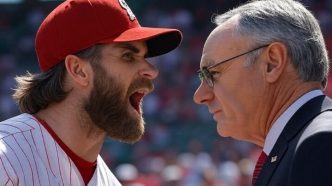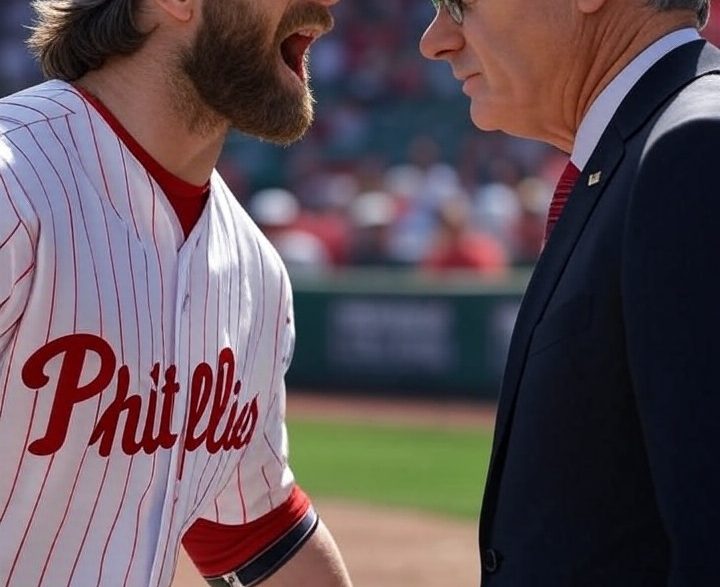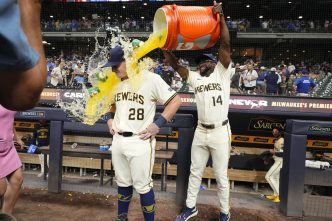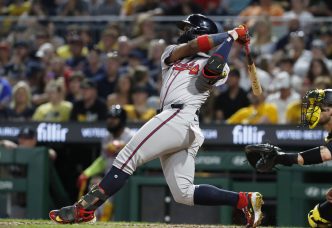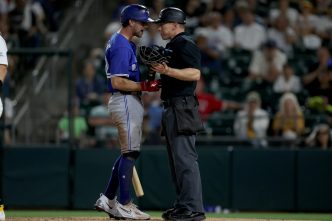In an eye-opening confrontation, Philadelphia Phillies star Bryce Harper confronted MLB Commissioner Rob Manfred during a recent meeting, expressing his frustrations over the potential discussions regarding a salary cap in baseball. As part of Manfred’s annual initiative to engage with players across the league, the meeting took an unexpected turn when Harper, who has emerged as one of MLB’s most significant voices, stood his ground.
Though Manfred carefully navigated the conversation without directly mentioning the term “salary cap,” the underlying economic concerns of the league became a hot-button issue. Harper, known for his forthright demeanor, grew increasingly agitated as the discussion pivoted toward topics that could affect players’ earnings and the sport’s financial landscape. Sources recalled Harper asserting that if MLB pursued a salary cap, players “are not scared to lose 162 games,” driving home his point with unmistakable intensity. His challenge to Manfred was simple: “If you want to speak about that, you can get the f— out of our clubhouse.”
In a rare display of tension, Manfred pushed back, maintaining the importance of discussing potential threats to MLB’s business model and exploring avenues to grow the game. To help ease the charged atmosphere, veteran outfielder Nick Castellanos stepped in, redirecting the conversation with more questions, which allowed the meeting to proceed without further escalation. At its conclusion, Harper and Manfred shook hands, although Harper reportedly distanced himself from Manfred’s follow-up calls the following day.
Castellanos later described the encounter as “pretty intense, definitely passionate,” underscoring the ongoing struggle between players and management over labor rights, economic issues, and the future direction of the sport. “That’s Harp. He’s been doing this since he was 15 years old. It’s just another day. I wasn’t surprised,” Castellanos noted, reflecting on Harper’s willingness to speak candidly.
Harper himself has not shied away from these issues. During a press briefing prior to a game against the Chicago White Sox, he acknowledged the substance of the discussion with Manfred but withheld specific details, opting instead to focus on his performance and the team’s dynamics. “I don’t think it does any good for anybody for that to happen,” Harper stated, emphasizing his intention to prioritize the game itself.
The looming expiration of the collective bargaining agreement between MLB and the Players Association in December 2026 has intensified calls for a salary cap from a faction of owners, a concept the MLBPA staunchly opposes. The players argue that a cap could entrench existing wealth disparities rather than alleviate them. For Harper, who’s represented by prominent agent Scott Boras, the potential for a capped system encapsulates a significant concern—one that he plans to address more in private discussions than in the public eye.
The chief topic of the meeting was indeed the imminent CBA negotiations, with echoes of past labor strife still fresh in the minds of many. Castellanos remarked on the precariousness of the situation, comparing Manfred’s talk of a “lockout” to a marriage discussion about divorce—a conversation best left undiscussed unless absolutely necessary.
While Manfred’s tenure has often been met with skepticism from players, especially when economic debates arise, he continues to engage with players in hopes of building a better rapport. The sentiment among players remains one of cautious distrust, particularly regarding the league’s past attempts to impose structural changes on financial matters.
MLB’s pursuit of a salary cap is rooted in a long history, dating back to the 1994 players’ strike that effectively canceled the World Series. The narrative surrounding financially struggling teams amidst soaring franchise values has resurfaced, raising questions about the genuine necessity of a salary cap.
As discussions regarding payroll discrepancies intensify, players are not shy about voicing their concerns during meetings with Manfred. The stark gap between teams like the Los Angeles Dodgers, who are spending upwards of $400 million, and the Miami Marlins, barely breaking the $86 million mark, illustrates the growing financial divides that have players grumbling.
The overarching goal of these meetings, as Castellanos notes, is to bridge the knowledge gap concerning the business landscape of MLB. With significant revenue generated last year and the league’s future plans to nationalize local television rights by 2028, understanding the financial elements is crucial for players. “There’s no players, there’s no Major League Baseball,” Castellanos emphasized, pointing out the mutual interest of both players and owners in maintaining a functional and equitable league.
Amid aspirations for a harmonious future in baseball, one thing remains clear: both players and management are equally invested in avoiding a work stoppage, underscoring their shared passion for the game and the desire to see it thrive.

